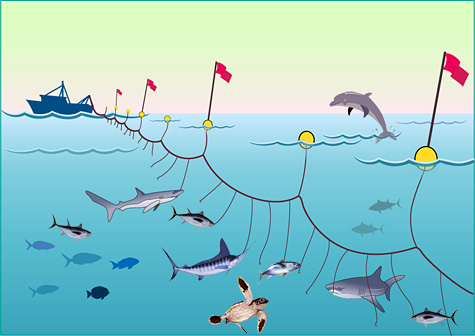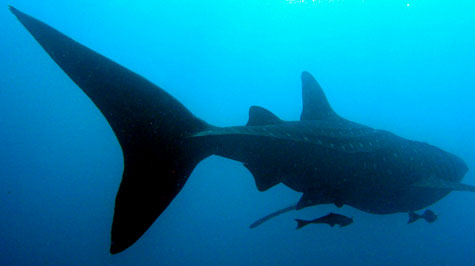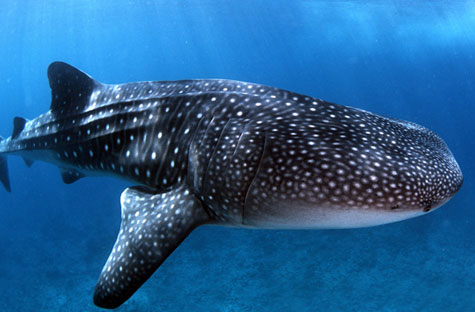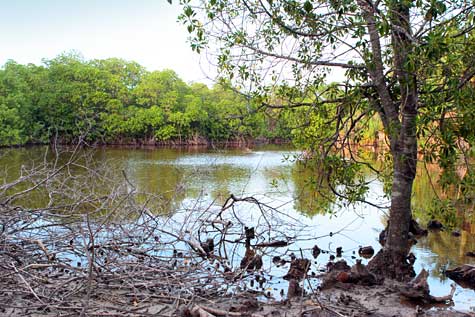Controversy Over Longline Fishery Plans in the Maldives
A controversial plan to permit longline fishing in the Maldives has shocked environmentalists and concerned citizens. While the government tries to justify the plan saying it will increase the fish catch and provide a higher income for the fishermen, the plan would have grave implications on the environment and the tuna fishery in the Maldives.
For centuries, successive generations of Maldivian fishermen have practiced the traditional pole and line fishery, which has been hailed as an environment-friendly method. While the Maldivian fishermen abandoned sails on their boats in favour of mechanization, and while the size of the fishing boats has increased dramatically over the past two decades, pole and line fishery has remained the hallmark feature of a unique fishing culture.
The government’s plan to introduce longline fishing to the Maldives could grossly change the landscape of tuna fishery in the Maldives. Longline fishery is criticized worldwide for the merciless death of species such as sharks, turtles and seabirds, all caught unwanted as by-catch. It is ironic that this method of fishery, which could lead to the death of hundreds of sharks in the Maldivian waters, is to be introduced just as the Maldives is about to impose a ban of shark fishery in the country.

Pelagic longline fishery for tuna has its own environmental side-effects, especially in terms of unwanted catch of sharks and turtles.
“We are implementing a total ban and then starting something that is shark fishing by another name,” Ali Rilwan, the Executive Director of Bluepeace, told the local online newspaper Minivan News.
“And the larger problem is how we will be perceived; our fish export is marketed abroad as one that is caught through a dolphin and environmentally friendly method,” Rilwan said.
The environment-friendly label that the Maldivian exporters have so proudly displayed on their fish products would lose its status as the longline becomes a widespread fishing method in the country. The fears Bluepeace has on how longline fishery could destroy the reputation of Maldives seem to be shared by other environmental organisations. Bite Back, a marine conservation group from UK, has told Minivan News that there is a real possibility of a UK boycott of tuna products from the Maldives caught through longline.
Across Europe and in the developed countries, consumers are becoming more conscious about their spending habits, the food they eat and the ecological costs involved in the food production. Retailers and department stores are offering products that cater to this new trend.
Marks & Spencer, a global retail giant, and one of the major buyers of Maldivian tuna, announced last year it would no longer buy tuna that is not caught by pole and line, Minivan News reported.
The government of Maldives says it is introducing longline to compensate for the steady decline of fish catch during the past few years. It argues that the big fishing boats used in the Maldives are unfeasible for traditional pole and line fishing. Instead of keeping the boats idle and moored, it could take to the seas again through longline fishery, argues the government.
However, one of the reasons why the larger boats are unable to spend more days on the sea and catch large quantities of fish is the limited supply of ice. There are no adequate mechanisms available for fishermen to spend more days out on the sea without the fish getting decayed. Furthermore, a small catch is not economically feasible because the boat owners have to repay huge amounts to the commercial banks for the loans they obtained to build the boats. Without any development banks in the Maldives, the boat owners have to go for costly loans with high interest rates from the few commercial banks in the Maldives. A small fish catch is not attractive when they have to repay the huge loans.
The size of fishing boats has increased significantly over the past few decades. At first this was thought to be a positive trend, increasing the efficiency of the fishing industry. However, today most of the fishing boats are moored when the fish catch is low. In addition, people demand larger harbours to accommodate these larger fishing vessels. Constructing ‘cut and paste’ harbours in islands without doing proper Environmental Impact Assessments are one of the reasons why the Maldives is experiencing severe beach erosion.

Modifying the existing fishing vessels with sails, and frequent use of sails with engines could reduce operational costs and carbon footprint of fisheries. (Image digitally altered)
The government’s controversial plan to send the larger fishing boats back to the high seas with longline is flawed in many aspects. The plan has severe economic and social implications too. For centuries Maldivian fishermen have been owners of the industry. The fish catch or the income obtained from the catch was divided among the boat owners and fishermen. The fishermen were recognised as important stakeholders and the income from the fishery was distributed more equitably than any other profession in the country.
The government’s longline plan would make the fishermen employees in the fishing industry. Longline fishing would be dominated by a few wealthy and large companies. Even the large boats currently used for pole and line fishery would not be able to compete with much larger boats the big companies would use. If a transshipment port in Ihavandhippolhu could hypothetically turn the fishermen into employees, the longline fishery could turn them into employees much easily. The fishery could also be dominated by foreign companies using their puppet or proxy Maldivian companies.
Longline fishery would ruin the reputation of the Maldives as a country practicing environment-friendly fishery and tarnish its image abroad. The publicity gained through the country’s cabinet having a meeting underwater last year could all be gone just like bubbles released by a scuba diver.





